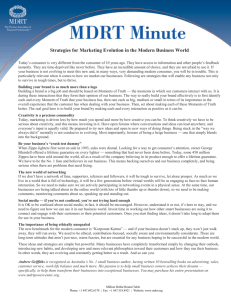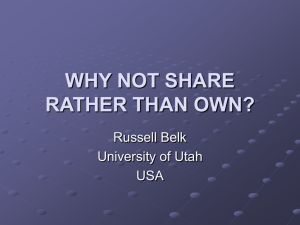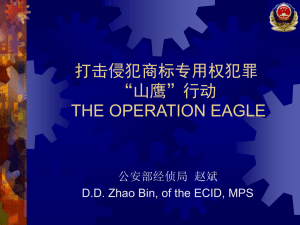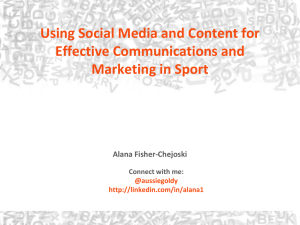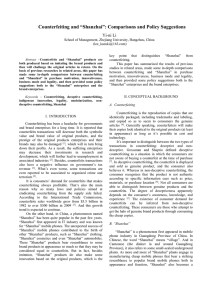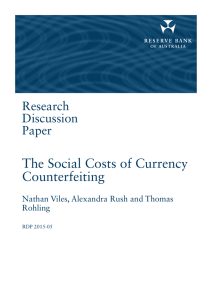Ownership, Ego, Sharing, and Counterfeiting
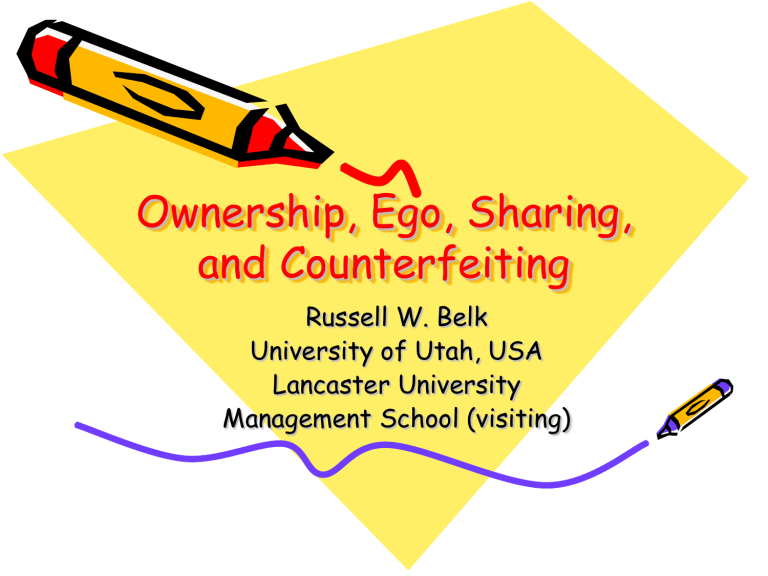
Ownership, Ego, Sharing, and Counterfeiting
Russell W. Belk
University of Utah, USA
Lancaster University
Management School (visiting)
What (if anything) is wrong with buying a fake Luis
Vuitton Handbag?
Is counterfeiting new?
Brand forgery is newest
Preceded by Money forgery
Preceded by Art forgery
Preceded by Notions of Specific Individuals as the sources of art
Preceded by the Rise of Possessive Individualism
(at least in some cultures)
All of Which are Preceded by Notions of Sharing
Premise: Counterfeiting is an unauthorized sharing of brands
Sharing: An Alternative to
Private Ownership
• Also Includes
– Voluntary lending
– Contractual renting
– Gift-giving
– Pooling & allocation of resources
– Authorized use of public property
– Unauthorized use by theft, vandalism, or trespass
[Fan Tin Tsuen No. 250
Opening Hours: Noon-4 a. m.
Outside catering order
Phone # 24713184]
What we Share
• We can share things, places, people, pets, ideas, values, time, affection, animosity
• Excludes non-volitional coincidence involving things we don’t own or control
– “Sharing” a common place of birth
– “Sharing” a language
– “Sharing” a set of experiences
Sharing Defined
• The act and process of giving or losing what is ours to others for their use
• The act and process of receiving or taking something from others for our use
• When we share what we feel is ours, others come to feel it is at least partly theirs to use
• Use may be for an indefinite or prescribed period
& for another’s exclusive use or for use by us as well as others
• Givers and receivers can be individuals or groups
• Distribution may or may not make the access to things more equal
Cultural Influences
• Sharing, possession, & ownership are all culturally learned behaviors
• In the West, possession & ownership learned first; sharing, fairness, justice later
• Australian aborigines learn sharing first
– Vestigial effect from nomadic past
– Led to difficulties with private cars & VCRs
• Culture also prescribes what is selfish vs. altruistic, generous vs. stingy, & fair vs. unfair
Mixed Effects of
Sharing
• Recipient can feel grateful or hostile
• We may feel we get our fair share, more, or less
• Can reduce envy & foster feelings of community or create dependency & feelings of inferiority
• We may see sharing as a sincere effort to help or a sop
• Can take place within excess or insufficiency
• We may share broadly or narrowly
Impediments to Sharing
• Feelings of object attachment
• Cathecting objects as part of extended self (e.g., body organs)
• Materialism
– The importance attached to possessions
– Components: envy, possessiveness, non-generosity
– Accounts of materialism in 4 cultures
• E.g., Christmas giving
– From broad charitable giving
– To narrow giving with the family
Sharing & the Museum
Without Walls
• Fine art is Finite
• But it can be broadly distributed
– Art Museums
– Inexpensive copies
• What is the problem here?
– Benjamin’s loss of “aura”
– Denigrating reproduction, fraud, fake, forgery
– Status hierarchies – e.g, Visiting Luxor in
Egypt vs. Las Vegas, vs. books, Internet & postcards
Incentives to Share
Intangibles
• Some of “our” intangibles are not legally ours – a view, an aisle seat, “our” song
• Other intangibles may be our property – ideas, designs, & various creations
– Academic ideas – ours vs. plagiarized
– Presenting & publishing = sharing
– It also = the way to make them ours
– We should give them rather than sell them
– We are more apt to share with doctoral students
– But sharing raw data = less likely
– Others may admire our garden, but may not borrow our tools, seeds, & potting soil
Sharing without Losing
• A song, joke, body, digital files
• Copies of books, journals, or videos
• The online gift economy
– Linux, Napster, freeware
– BBSs, chat rooms, web sites
• Why share in these virtual communities?
– Keeping while giving (Weiner)
– Cheap altruism (Coyne)
– Utilitarianism
– True hi-tech gift economy
Intangible Sharing
Communities
• Marker goods
• Sports fans, music fans, brand cults
• Proselytizing & recruiting members
• Feeling of minority status, persecution, & uniqueness
• iPod?
Case in Point:
The Grateful Dead
• Long known for “tapers” freely trading
(not selling) concert tapes
• Evolved into digital downloading
• But in late November, 2005, GD did an about face & told Live Music Archive to stop making it available
• Fan uproar caused a partial reversal
• But GD already suggested shift
– From Internet as cornucopia
– To Internet as pay-per-play jukebox
Brand Grateful Dead
• “The Dead had created an anarchy of trust, going not by statute but by instinct and turning fans into co-conspirators, spreading their music and buying tickets, T-shirts and official CD’s to show their loyalty. The new approach…changes that relationship….The change also downgrades fans into the customers they were all along. It removes…brand value from the Dead’s legacy by reducing them to one more band with products to sell” (Jon Pareles, “The Dead’s Gamble: Free
Music for Sale” NYT, December 3, 2005.
Incentives to Share
Tangibles
• School boys/girls sharing clothing
• Leveraged lifestyles
– Lease vs. buy car
– RealNetwork’s Rhapsody
– Blockbuster, Netflix
• Virtual Renting
– eBay & flipping (cell phone, computer, iPod, sports equipment)
– Calloway
– Bag, Borrow, or Steal
– Buy, rip, sell CDs
Other Tangible Sharing
Incentives
• Family heirlooms & extended self
• Sharing within the family
• Group sharing (e.g., time-share homes)
• Institutional sharing—e.g.,
– Museums
– National Parks
• But, beware the tragedy of the commons
Involuntary Sharing:
Counterfeiting
• Unlike graffiti or vandalism in intent
• Sometimes condoned by the brand counterfeited (e.g., Hilfiger, Nike, Polo)
• Usually strongly opposed
• A victimless crime?
• Justifications
– Robin Hood
– Decency
– Righting the crimes of rapacious capitalism
• Those who buy are not usually in the target market
• Imitation may flatter
• Helping entrepreneurs in the less affluent world
• Helping consumers in the less affluent world
Problematizing Brand
Counterfeiting
• Grades of Counterfeits
• Counterfeits as Better than “the real thing” as defined by to intellectual property laws
• Ranges of counterfeits
– Beverages—Pepsi, 1 st Growth Bordeaux
– Designer brands—facsimiles vs. ironic
(Baudrillard’s simulacrum vs. fake or Joshua
Glenn’s “fake authenticity”--Hermenaut)
– Motorcycles (5 of 6 Yamaha bikes—Rana,
SSRN) or aircraft parts
– Pharmaceuticals—Viagra vs. AIDS drugs
Conclusions
• Social desirability of sharing
– E.g., U.S. home ownership (> 2/3)
– Why? Community, civil obedience, investment
– Why not? ID through things vs. people, Bowling
Alone, financial security vs. social security, economic capital vs. social capital
– Privatization of the nuclear family – radio, TV, car, computers, bathroom, meals, bank accounts
& credit cards
• Compensatory rise of virtual communities & online sharing
Conclusions
• Social desirability of renting
– Spouse
– Womb
– Soldiers
– Children
• Online sharing vs. intellectual property laws vs. public access; dreams of free access
• Post-materialism, VS, downshifting, dematerializing, experience economy?
• One boom U.S. rental market: storage
• Business may lead the way with the virtual corporation
